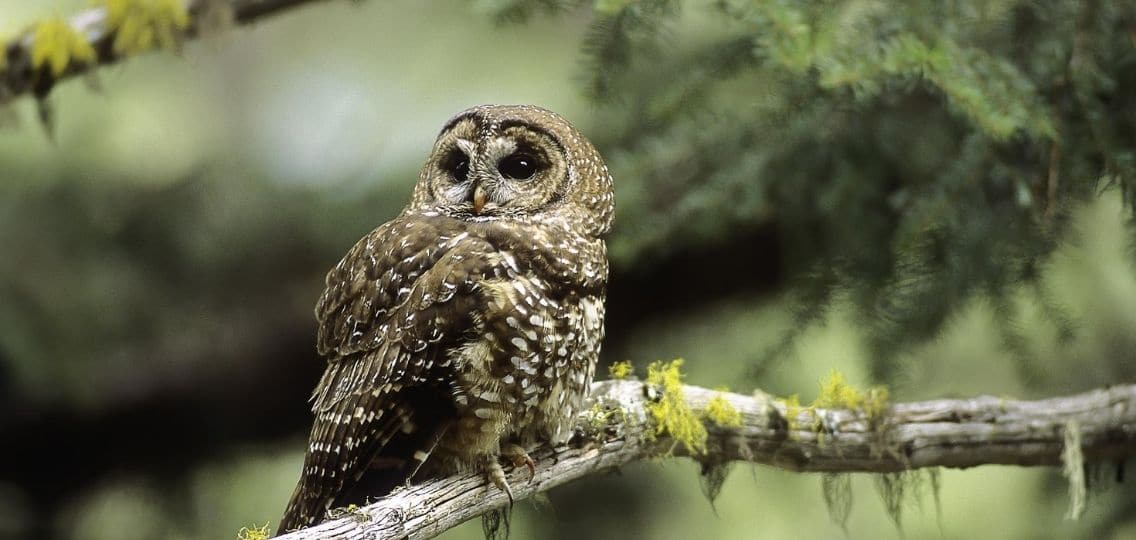VANCOUVER / UNCEDED xʷməθkʷəy̓əm, Sḵwx̱wú7mes and Sel̓íl̓witulh TERRITORIES – Canada is down to the last pair of spotted owls in the wild — and B.C. is logging away their forest home located in the Spuzzum Valley, in the territory of the Nlaka’pamux First Nation community of Spuzzum. The pair of endangered owls have hatched chicks for the past two years and at least some of those have been captured by the B.C. government and taken to an owl breeding facility in Langley.
“It’s extremely alarming to see rare old-growth forests being logged in Spuzzum Valley, home to the last remaining breeding pair of spotted owls in Canada,” said Wilderness Committee Protected Areas Campaigner Joe Foy. “The big trees are being dragged out and loaded onto trucks right now — with more old-growth forest felling planned soon.”
There are now only three known remaining spotted owls living in the wild in Canada. All three live in southwest B.C., including the only known breeding pair, in the Spuzzum Creek Watershed, about 50 km north of the township of Hope, B.C. within Nlaka’pamux First Nation territory. Despite these deeply concerning numbers, the B.C. government continues to authorize logging here through BC Timber Sales, the government’s own logging agency. This poses an imminent threat to the species’ survival.
Ecojustice, acting on behalf of the Wilderness Committee, has demanded the Federal Minister of Environment and Climate Change Jonathan Wilkinson take immediate steps towards implementing emergency order protections for endangered northern spotted owls in British Columbia and their habitat, under Canada’s Species at Risk Act. They submitted a letter to the Minister’s office this morning.
“Decades of provincial mismanagement have left spotted owls without legal protection and decimated the old-growth forests where they once lived,” said Kegan Pepper-Smith, Ecojustice lawyer. “Without federal emergency action, there is a high likelihood that this species will disappear from the wild in the near future.”
B.C. is one of few provinces that doesn’t have a standalone species at risk law, although it is the province with the most biodiversity and more than 2,000 species at risk of disappearing. Northern spotted owls are one of these species, and their numbers have been steadily declining in their range in Canada primarily due to logging of old-growth forests. Biologists estimate that before industrial logging decimated southwestern B.C.’s old-growth forests, there were roughly 500 pairs of northern spotted owls living there.
“Decades of forestry mismanagement and the refusal to enact a B.C. species at risk law has taken its toll on this species and many more,” said Foy. “The federal government is obligated under SARA to stop the logging in Spuzzum Valley now.”
While the province maintains a captive breeding program, it has yet to successfully introduce a captive raised spotted owl into the wild. Without federal intervention to protect the species, the groups say spotted owls — and their old-growth forest habitat — are at serious risk of disappearing from the wild.
“What happens to the spotted owl is part of a bigger story and choice we need to make. Globally, plants and animals are disappearing at an alarming rate — and as the province with the largest number of at-risk species, B.C. has much to lose,” said Pepper-Smith. “When provinces fail, the law requires the federal government to step up. Inaction — especially in a biodiversity crisis — is not an option. If they neglect to do so, we stand to suffer an incalculable loss.”
-30-
For images and B-roll please click here.
About:
Ecojustice goes to court and uses the power of the law to defend nature, combat climate change, and fight for a healthy environment. Its strategic, innovative public interest lawsuits lead to legal precedents that deliver lasting solutions to Canada’s most urgent environmental problems. As Canada’s largest environmental law charity, Ecojustice operates offices in Vancouver, Calgary, Toronto, Ottawa, and Halifax.
Wilderness Committee protects life-giving biological diversity in Canada through strategic research, community mobilizing and grassroots public education. As the people powered wilderness preservation group, we unite 60,000 supporters, volunteers and activists from coast to coast to coast, working together to preserve wilderness, protect wildlife, defend parks, safeguard public resources and fight for a stable and healthy climate. We have offices in Vancouver, Victoria, Winnipeg and Toronto.

